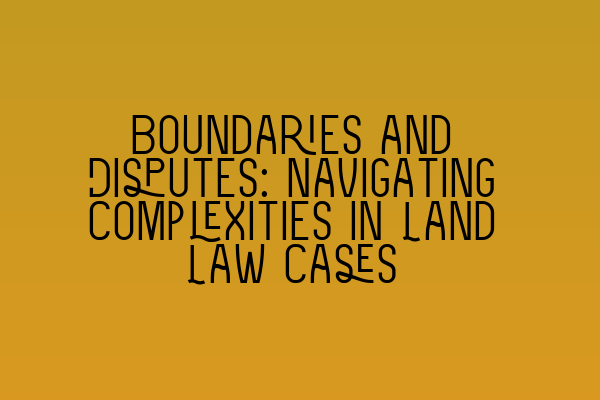Boundaries and Disputes: Navigating Complexities in Land Law Cases
Welcome to the SQE Property Law & Land Law blog! In this article, we will delve into the intricate world of boundaries and disputes in land law cases. As a solicitor, it is essential to have a thorough understanding of these complexities in order to effectively represent your clients and protect their property rights.
The Importance of Boundaries
Boundaries play a critical role in land law by defining the extent of a property owner’s rights and responsibilities. They establish the physical limits of a property and determine who has the right to use and possess the land. However, disputes can often arise when the exact location or ownership of a boundary is in question.
In order to resolve boundary disputes, it is crucial to carefully analyze the relevant legal principles, legislation, and case law. By doing so, solicitors can provide their clients with accurate advice and representation, helping them navigate the complexities and achieve a satisfactory outcome.
Common Types of Boundary Disputes
Boundary disputes can arise for a variety of reasons and in various circumstances. Some of the most common types of boundary disputes include:
- Disputes over the location of a boundary line
- Disputes regarding the ownership of a shared boundary feature
- Disputes related to encroachments or trespassing
- Disagreements concerning easements or rights of way
Each of these disputes presents its own set of challenges and requires careful consideration of both the law and the specific facts of the case. As a solicitor, it is important to gather all the necessary evidence, including title deeds, surveys, and historic documents, to construct a compelling argument on behalf of your client.
Navigating the Legal Framework
When it comes to boundary disputes, solicitors must navigate a complex legal framework that encompasses legislation, regulations, and case law. One key piece of legislation to consider is the Land Registration Act 2002, which provides rules and procedures for determining boundaries and resolving disputes.
Additionally, case law plays a crucial role in interpreting and applying the law to specific boundary disputes. Courts rely on established legal precedents to make informed decisions and provide guidance on how similar cases should be addressed.
It is essential for solicitors to stay updated on the latest legal developments in land law to provide the most accurate and effective advice to their clients. By attending continuing professional development (CPD) courses and keeping abreast of the latest case law, solicitors can strengthen their legal knowledge and ensure they are well-equipped to tackle complex boundary disputes.
Resolving Disputes: Alternative Dispute Resolution and Litigation
When it comes to resolving boundary disputes, solicitors have two primary options: alternative dispute resolution (ADR) and litigation.
ADR methods, such as mediation or negotiation, can offer a more cost-effective and time-efficient approach to resolving disputes. These methods allow the parties involved to come together with the assistance of a neutral third party and work towards a mutually agreeable solution. ADR can help preserve relationships and allow the parties to maintain control over the outcome of the dispute.
However, in some cases, litigation may be necessary. Going to court can provide a definitive resolution when parties cannot reach an agreement through ADR. In such instances, it is imperative to present a compelling case based on solid evidence and persuasive legal arguments.
Conclusion
Boundary disputes can be complex and challenging, but with a thorough understanding of the legal principles and a strategic approach, solicitors can effectively navigate these complexities on behalf of their clients. By staying updated on the latest legal developments, utilizing alternative dispute resolution methods when appropriate, and advocating for their clients in court, solicitors can help resolve boundary disputes and protect the property rights of their clients.
If you are preparing for the SQE exams and would like to practice your knowledge of property law or land law, be sure to check out our SQE 1 Practice Exam Questions and SQE 1 Practice Mocks FLK1 FLK2 articles. Additionally, if you need guidance in preparing for the exams, our SQE 2 Preparation Courses and SQE 1 Preparation Courses can provide you with the necessary support and resources. Finally, if you need information on upcoming exam dates, refer to our SRA SQE Exam Dates article.
